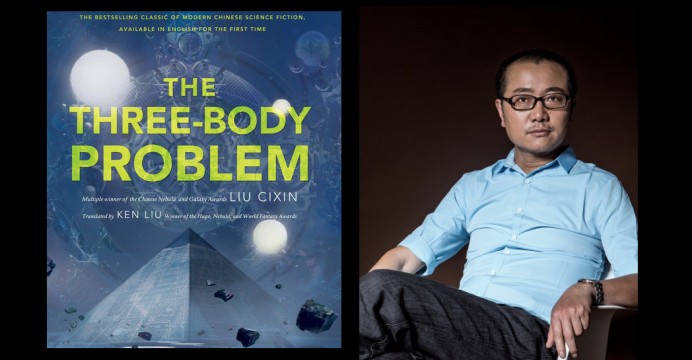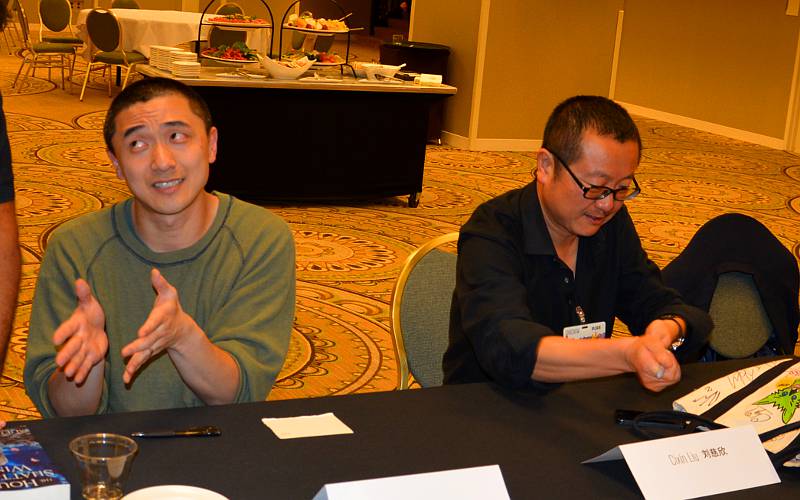Liu Cixin is China’s most famous science fiction author. He has won the Galaxy, China’s version of the Hugo, 9 times. His trilogy, “The 3 Body Problem,” won the Hugo and Galaxy for best novel and was nominated for a Nebula. The story was first published as a series in Science Fiction World, China’s #1 science fiction magazine. The English version was translated by Ken Liu and published by Tor. A screen version, produced in China and starring Chinese A-listers, will be released in July.
CARL SLAUGHTER: Why was science fiction not taken seriously in China until several years ago?
LIU CIXIN: Actually, the 80s was a peak period for Chinese science fiction. Some books during that period sold as many as 4 million copies. When public officials deemed parts of science fiction socially unhealthy, publishers went through a slump. In the 21st century, science fiction in China made a comeback. This might be related to China’s modernization. Modernization focuses people’s attention on the future. They see the future as full of opportunities, as well as crisis and challenges. This set the stage for the development of science fiction and an interest in this literary form.
CS: “The Three Body Problem” significantly contributed toward science fiction becoming legitimate and popular literature in China. What is the appeal of the story to a broader audience?
LC: Many reasons. “The Three Body Problem” describes a great crisis for the human race. Namely an alien invasion. The story is closely related to reality. It discusses issues of morals and humanity, politics and cultures, from the perspective of universe, and also shows China’s current and future situation and the world’s perspective on space. Part of the appeal of the story is that there’s never been a story like “The Three Body Problem” in China. Also, past science fiction fans were teenagers and college students. Now they are grown, have high social status and more discourse power, and can make a difference in promoting “The Three Body Problem” in social networking media.
CS: How did you develop a love for and cultivate an understanding of the science fiction genre in an age when there was little available to Chinese science fiction fans?
LC: My interest in science fiction is mainly from my interest in science, my curiosity about the universe and nature. After being introduced to science fiction, I was fascinated with imaginable worlds and joined the first generation of science fiction fans.
CS: Your stories seem to consistently fit these patterns: apocalyptic, macro structure, Sino-centric, scientist centric, and hard science. Is that an accurate analysis?
LC: Science fiction is imaginative in ways other genres cannot be. This is the main attraction of science fiction. The end of the world and the macro structure you mentioned belong to this category. I’ve always believed the science premise is one of the best elements of science fiction. I use the science background to create the literary form of the beauty of science. In my novels, scientists and science are prominent. You mentioned Sino-centric. My stories are Sino-centric because my audience is primarily Chinese readers and because I’m familiar with Chinese history and culture. “The Three Body Problem” has a lot of Chinese elements, most of the people in the story are Chinese, and Chinese characters save the world. But I believe in human-centric science fiction, not Chinese-centric science fiction.
CS: Is there a science fiction movement in China, with magazines, ebooks, podcasts, fan clubs, conventions, etc?
LC: Compared to English language science fiction, the percentage of fandom in China is relatively small, but active. There are few Chinese science fiction magazines, Science Fiction World being the most influential. China’s literature network is well developed. Most science fiction stories in China are very long and serialized on the Internet. There are a large number of science fiction fan clubs in China. Most of them are on university campuses. There are also some online groups. There are many activities related to science fiction every year. Mainly the Milky Way and Nebula awards. The former is sponsored by Science Fiction World Magazine. The latter is sponsored by the Chinese Science Fiction Association. Large numbers of fans attend conferences. There are also online forums. “The Three Body Problem” has a reader forum. All of the characters in the book have a profile on WeiBo.
CS: China is a big market for Hollywood and science fiction has been mainstream in America for some time. What about Chinese produced science fiction movies and TV shows in China? Is your screen industry starting to catch on to the potential science fiction market?
LC: Screen science fiction in China is not well developed. Most movies are low budget and don’t have much impact. Most science fiction movies watched by Chinese audiences come from Hollywood. The highest grossing science fiction movies in Chinese markets are Hollywood movies. But the situation is changing. The domestic film and television industry see screen science fiction as having huge market potential. On the other hand, producers, directors, and screenwriters lack experience with science fiction. So Chinese screen science fiction is still in infancy. If it wants to be an A industry, it has a long way to go.
CS: Is there a screen version of “The Three Body Problem” in the works?
LC: The first movie in the “Three Body Problem” trilogy finished shooting in March of last year and is in production. The investment was huge and generated a lot of attention at home and abroad.
CS: What do you see in the future for print Chinese science fiction in China, print Chinese science fiction in the west, and print western science fiction in China?
LC: Since the 80s, China has been introduced to a large amount of foreign (mainly English) science fiction. Some influential American science fiction has been translated and published in China. The publication cycle has been greatly shortened. For example, when stories win a Hugo/Nebula, they are soon after published in China. Foreign publishing in China is still in infancy and quantity is tiny. “The Three Body Problem” is the only Chinese science fiction novel published in English. It won a Hugo. Some Chinese writers have appeared in western magazines and websites. There are 2 Chinese writers published in Nature. In my opinion, science fiction is the most global literature because it deals with issues relevant to all races. So I prefer English speaking science fiction fans read my novel because it’s science fiction, not because it’s “Chinese” science fiction.
CS: One of the translators for the English version of “The Three Body Problem” is Ken Liu. He’s a very popular author in America. I met him through a writing workshop and later interviewed him. How did you meet him?
LC: I used to read the books written by Liu Yu Kun and I appreciated it very much. The first time I met him was in the Nebula ceremony held in Beijing in 2013. Since then, we have had many chances to communicate and cooperate because he is the translator of first and third “The Three Body Problem” novels.
CS: Are you planning to travel internationally to promote the English version of “The Three Body Problem”? Will your American fans be able to meet you at a convention? Will there an English website for “The Three Body Problem?”
LC: I carried out these kinds of activities in America in 2014. I met many readers and science fiction writers in New York and Chicago and we had pleasant conversations. Last year, I went to Turkey to promote “The Three Body Problem” in Turkish. I am going to promote this book in Europe. There are 2 main websites of “The Three Body Problem.” One is the English version; the other is the website which is made by film producer. The latter is http://www.3body.com/
ENDNOTE
MIKE GLYER: Carl, I’ve seen the author’s name rendered as Cixin Liu and Liu Cixin. Which is right?
CARL SLAUGHTER: Both versions of the name are correct. In Chinese culture, the family name is listed before the given name; in western culture, vice versa. Thus, we English speakers call the translator of “The Three Body Problem” — and he calls himself — Ken Liu. When I tell my Chinese students that I interviewed China’s most famous science fiction author, I write “Liu Cixin” on the board; but when I tell them that I also interviewed his translator, I write “Ken Liu” on the board; same when I assigned my college translation majors several English science fiction stories, including “The Paper Menagerie,” as homework.
To make identification even more complicated, his name has 2 Chinese versions. One written in simplified Hanzi, which is used on the mainland; one written in traditional Hanzi, which is still used in Taiwan and Hong Kong. BTW, the spelling with English letters is called Pinyin. At the request of his American publicist, I submitted the interview through her; at the insistence of his Chinese publicist, his American publicist had to go through her. Since I conducted the interview through 2 intermediaries, I’ve never actually corresponded with the author directly, so I’ve never seen how he signs his name. Anyway, Wikipedia lists his name as Liu Cixin.
Discover more from File 770
Subscribe to get the latest posts to your email.




I was at a formal international dinner last night where I fell into conversation with two scholars from a Chinese thinktank. They challenged me to say what I knew about contemporary Chinese literature, and were very impressed that I had read The Three Body Problem – they had heard of it, but hadn’t actually red it. On the other hand they had not heard of The Fat Years by Chan Koonchung: of course, it’s not available on the mainland, only in Hong Kong and Taiwan.
Had my problems with 3BP, the traditional ones, of the science and the characterisation.
Heard one of his shorter stories on the Clarkesworld podcast and was delighted with it.
Yuanyuan’s Bubbles
Pingback: Death’s End, Concusion To The Three-Body Trilogy | File 770